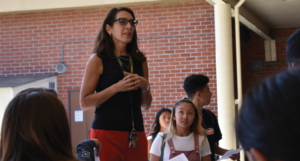Starting this year, athletes no longer have to stay on campus if they have an off-season seventh period sport.
The new system allows students to record their hours spent during the season practicing, traveling or playing, which will then be checked by the coach.
The coaches will verify by marking students’ attendance to prevent false hours.
“The general plan is that walk-on coaches will be able to calculate the hours of students to equal the same number of hours for PE credit,” Athletic Director Ms. Sarah Penalora said. “Whenever the coaches are calling their practices, they will keep a record of it: of what they do, where they are and that should equal the same number of hours for PE.”
Coaches will be confirming athletes’ hours to prevent any students from recording hours that they were not spent doing physical activity.
“We really want to help students direct themselves into maintaining accurate logs,” Ms. Penalora said. “It’s a way for students to keep a personal record of their commitment to their team and to their own athletic education.”
Last year, athletes who were off-season for a seventh period sport had to stay at school during seventh period Fall or Spring Athletics.
This new system, student athletes can now return home to eat, rest or do homework.
Students no longer have to stay at school during seventh period off-season.
This new policy means that off-season athletes will be participating in an equal amount of physical activity as regular PE students in terms of logged hours.
“It felt as if the students were wasting valuable time and we wanted them to have a better experience this year,” Ms. Penalora said. “They weren’t allowed to [go home], and there was no facility on campus that could accommodate the numbers adequately for students off-season.”
South Pasadena High School and Glendora High School off-season athletes have also received PE credit using the new system being implemented at TCHS.
In previous years, the policy was that all off-season athletes had to stay on campus in a designated place.
Since there was no designated facility to house the athletes, Fall or Spring Athletic students could potentially disrupt other classrooms or students in the media center.
“When we had to stay [at school], I would always have to stay up late to do homework, or study for tests, but because of the change Ms. Penalora put into place, I could at least start sooner and get more sleep the next day,” Junior Taylor Rose said. “Even if it is only one hour, it makes a difference in the long run because I won’t feel as stressed with getting all my priorities done.”

